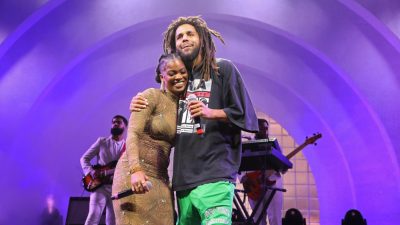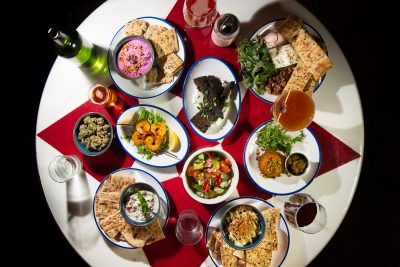Interview with 2018 NBCC Poetry Award Finalist Layli Long Soldier
For the past four years, the National Book Critics Circle has partnered with The New School’s MFA Creative Writing program, allowing the students to interview each of the NBCC Awards Finalists. In addition to building excitement for the Awards Finalist Reading and Ceremony held at the New School March 14th-15th, these interviews have built an intergenerational bridge between the writers of today and tomorrow.
This year, as part of the ongoing collaboration, and in support of the NBCC’s conversation about reading, criticism, and literature that extends from the local to the national, Brooklyn Magazine will publish and promote the interviews between NBCC Finalists and the current students of The New School.


Layli Long Soldier’s debut collection of poetry, Whereas (Graywolf) was written in part as a reaction to the 2010 Congressional Apology to Native Peoples of the United States, which is a resolution located deep within a document called the Defense Appropriations Act. President Barrack Obama signed the apology without announcing its existence to Native people or inviting Native American leaders to witness the signing. Long Soldier’s debut collection unravels the language of treaty, apology, and everyday conversation into poetry. She is Oglala Lakota, and stresses that her work does not speak for the entirety of Native American people. She is herself, an electric current of “I,” a laughing beam of the first-person, currently living in New Mexico, and poet-ing in the glow of her PEN/Jean Stein Book Award, her Whiting win, and her recent NBCC poetry award nomination.
What is your favorite punctuation mark, and why?
My favorite punctuation mark? That’s hilarious. I like the period. I often prefer using a period instead of a question mark. I don’t like what the question mark does to the voice. I don’t think a question has to change the body, the inflection, and the voice. I much prefer to use the period over the question mark. It’s so final. I just think it’s cool.
I believe Layli Long Soldier has thought a lot about punctuation.
Punctuation is really, ultimately, to score your work, almost like musical notation. It indicates breath. It indicates rest, pause, and so forth.
I know! Well, Whereas lets me think about the page and the markings upon it. One of my favorite lines in your writing is from the first Whereas statement:
Pages are cavernous places, white at entrance, black in absorption.
Echo.
The page is a place where thoughts can have physical consequences. For example, the treaty. The treaty is the ultimate representation of words having physical effects. The “penning” of a treaty becomes the literal “penning” of, quote the congressional apology, “Indian tribes within their boundaries.”
Well absolutely! It is language. Language that has had a true physical binding upon Native people’s lives—a physical effect on how we live and where we live. I used to teach at Diné College, which is the tribal college on the Navajo Nation. One of the classes I taught was a fundamental reading class. It was a class to bring new students up to college level reading. Some of the students had not read much before starting college. But the very first thing I had them read in this class, even though we were supposed to start at a very simple level, was their treaty.
That’s very difficult language to unravel. We took it slowly. We worked in groups with each article of the treaty. That was the one thing I wanted to impress upon them, that this is what directly affects your people, your families, your community. We’ve got to become comfortable with reading this language. As young people, you are not in the same position as your leaders [who signed the treaties with X’s instead of their names]. You have the opportunity and the chance to unravel this language and understand it.
Language is a very physical thing. It affects you. We don’t always remember that.
Maybe a poem is a moment of contact between the outer and the inner. I’m reminded of the incredible way you bring us to the image of Andrew Myrick’s mouth stuffed with grass at the end of your poem, 38. It’s then that the poem becomes so physical, both for the reader, and within the imagery. You write:
I’m inclined to call this act by the Dakota warriors a poem.
There’s irony in their poem
There was no text.
“Real” poems do not “really” require words.
But at the same time, we need the words of Andrew Myrick to the starving Dakota: “If they are hungry, let them eat grass,” to inform us why the action of the Dakota people is a poem. Do you remember where you were when you first got the image of the grasses, the image that runs throughout Whereas?
I remember. I had already sent a first draft of Whereas to Graywolf. They had written back to say they were interested in my work, but the manuscript needed more time. I remember [being] really disheartened.
Ultimately, it did need some more work. It took me about a year to send in a second draft. During that year, I worked on the ordering and orchestration of the manuscript a bit more. I felt like I needed a kind of through line. Around that time I would go up to visit my family in South Dakota. One of the things that would make me feel at home was seeing and smelling the grasses. That smell and the sight of these long stretches of grass—man, I just can’t explain it. It’s a sense of belonging.
I would go to visit and then drive back down to the South West. Where we live, there really is not much grass.
When I heard you lived in New Mexico, I thought, but wait, there’s no grass there!
I know! I remember writing this piece, “Irony.” It’s a real skinny poem. It was a piece I made when I was living in Tsaile, Arizona. I was thinking about the fact that there was no grass there. I began to realize that I had this kind of longing. I looked through my pieces and I noticed there were a few other places I had written about the grasses. I started to recognize a pattern in the work and my emotional leaning. Then I became intentional with it, and drafted a few more pieces for the purpose of bringing the book together through grass.
When did you hear the story of the Dakota 38? Was that before or after you decided on the through line?
I heard the story many years ago, when I was much younger. It’s one of those stories I heard as a young person. That moment had always stuck with me, for years. It was something I knew through word of mouth. Because it was such a vivid image, the moment of finding Andrew Myrick’s body. I wanted to write something about it. I began researching. That story is actually a documented story. There are different tellings of it, but they are all almost the same.
You’re unraveling the bureaucratic language of treaties, of narrative language, or of the superimposed language of English on Native America. You show us the fallacy and the successes of language as it relates to apology. How would you define what a meaningful apology is?
In a way, I did define it poetically, in the 5th Whereas piece. I wrote about an apology I got from my father. This was many years ago, when I was much younger. It was probably the most effective apology I’ve had in my life. Really, it was so effective, so magical, that I was able to put away a whole lifetime of grievances, of hurt, and of pain. I was able to put all of that away within minutes, just sitting with my dad and listening to him, and seeing a kind of sincerity. Seeing it, and feeling it physically. Physically, you can feel it.
That was testament to the power of a real and sincere apology. I still cannot really define it in a formulaic way, but that was the closest I could come to defining meaningful apology – in a poem.
What made you choose to use the singular “I” in your work?
A lot of the pieces in here do address aspects of Native history, or language, or identity in some way. Granted, not all of my work has to do with Native issues. Some of it is about writing or being an artist. Some of my work is about Motherhood. The “I” is important.
I’m very conscious about using the pronoun “we,” and not speaking for others, or representing others. I try to only speak for myself. If the work does resonate with others, and others connect to it, that’s a blessing. I have a very conscious relationship to the pronouns I chose.
I think that’s very important—because people are looking to a queer poet, or a black poet, or a native poet, and thinking, this person speaks for an entire group. All we can ever do is speak for ourselves and our personal histories.
Absolutely. I can’t even speak for my own family. Within my own family, there are many diverse views and experiences.
It’s funny. I’m actually working on my next book, and it’s tentatively titled WE. The reason the working title is WE, is because it’s a book of collaboration. I’m working on pieces that involve others in some way.
Who are you collaborating with?
They’re not straightforward collaborations. For example, I have a very, very, very long poem that comes from an exhibit I had in Canada. I had people submit little pieces of paper into these boxes that I made, on the subject of grief. I had certain instructions. They inserted names of people, or questions they had, or ways of dealing with grief. The gallery just sent all those little pieces of paper back to me. I have them spread out on a table in my house. I have a whole chorus of voices on the subject of grief. I’m working right now with those submissions. I’m meditating with them and orchestrating them on the page, and then writing my own responses.
Can you speak to the role of motherhood in your poetry?
If I say anything, it’s probably going to sound pretty cliché. But my daughter is the center of my life. She’s the ultimate thing that gives me a sense of purpose and drive. She is the thing that makes me get up, keep going, and keep moving forward. Because I must.
You might also like 


























